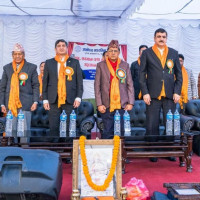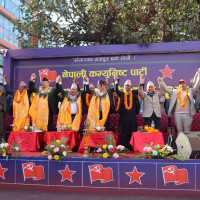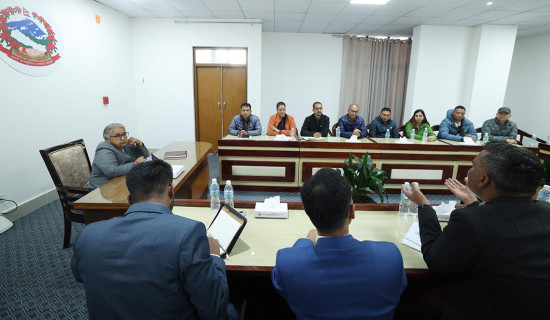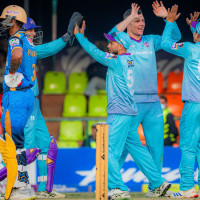- Monday, 1 December 2025
Nepali Communist Party formed forging 10 left parties
By Staff Reporter,Kathmandu, Nov. 6: Ten communist parties, including the CPN (Maoist Centre) and the CPN (Unified Socialist), have finally merged to form a new political force, the Nepali Communist Party (NCP).
The unification was declared by unveiling the new party’s 23-point manifesto at a special ceremony held at Bhrikutimandap, Kathmandu, on Wednesday.
The announcement was made by Dev Gurung, a senior leader of the newly formed party.
The merger brought together several left-oriented groups, including the CPN (Maoist Centre), CPN (Unified Socialist), Nepal Samajwadi Party, Janasamajwadi Party Nepal, CPN (Maoist Socialist), and NCP (Samyabadi), among others.
With the formation of the new party, the CPN (Maoist Centre) that waged an armed revolt, which culminated into the death of 17,000 Nepalis and the end of the monarchical system in Nepal in 2008, has itself become a history like the monarchy with the merger.
Similarly, the CPN (Unified Socialist) formed by Madhav Kumar Nepal by breaking the CPN (UML) in 2021 could survive only four years.
The unification proposal, tabled by Mahendra Raya Yadav, was approved by the gathering, appointing Pushpa Kamal Dahal ‘Prachanda’ as the coordinator and Madhav Kumar Nepal as co-coordinator of the new party.
Senior leaders, including Narayan Kaji Shrestha, Jhalanath Khanal and Bamdev Gautam, along with cadres were present on the occasion.
According to the party’s declaration, its guiding ideology will be Marxism-Leninism, and its programme will be based on scientific socialism with Nepali characteristics.
The party also unveiled its new election symbol, a five-pointed star.
The newly formed party’s immediate priority includes safeguarding
the achievements of the capitalist-democratic revolution, protecting national sovereignty, promoting good governance, and laying the foundation for socialism through social and economic transformation, it was informed.
The parties have also agreed to hold a national unity convention within six months to formalise the merger.
Coordinators and co-coordinators will be appointed at all levels, from central to ward committees, following a collective leadership system guided by democratic centralism.
Addressing the event, coordinator Prachanda said that the Gen-Z movement played a major role for the historic unification of 10 communist parties.
Senior leader Khanal added that unity among communist parties is essential at this time.
However, some leaders have opposed the merger. Ghanshyam Bhusal, general secretary of the CPN (Unified Socialist), announced that his party will not join the new party.
Organising a press meeting on Wednesday, Bhusal cited concerns over current leadership and working methods. He claimed that his party plans to reorganise itself through a national assembly by December to address national issues.
Similarly, Janardan Sharma of CPN (Maoist Centre) warned that the merger without ideological clarity, historical review, and organisational preparation could weaken the party’s revolutionary character and the broader leftist movement.








-square-thumb.jpg)








